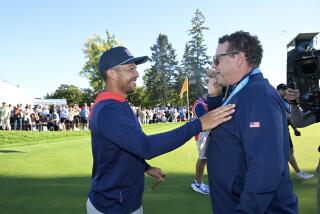U.S. Curling Team’s Run in Prime Time Is Canceled
- Share via
PINEROLO, Italy — Apparently the sport of curling is enjoying a popularity blip in America these days, the spark of a groundswell fueled by television exposure from the 2006 Winter Olympics.
The U.S. curlers say that since they began competing here, they have received dozens of e-mails a day, some from what they refer to as “non-curling states,” some involving marriage proposals.
First Lady Laura Bush has yet to watch curling in person, as she did speedskating, but word got back to the team that President Bush watched a little on television.
“It’s pretty exciting to be here as a nobody and get some attention,” team member John Shuster said.
Perhaps this newfound celebrity, such as it is, will take some of the sting out of an 11-5 semifinal loss to Canada on Wednesday night that sent the U.S. to the bronze-medal match on Friday.
The Canadians know something about being popular, in curling terms, hailing from a country where the sport can draw millions of television viewers. At the Pinerolo Palaghiaccio, they acted like established stars, taking control early.
In the fourth end -- a curling game is made up of 10 ends, or innings -- Canadian skip Brad Gushue played a skillful last stone, executing something called a “raise tap-back” to give his team, or “rink,” a 4-2 lead it would not relinquish.
Although aficionados like to think of the sport as “chess on ice,” it more closely resembles shuffleboard, with players sliding granite stones, trying to place their shots closest to the center of a painted target known as “the house.”
In the U.S., cable television has been showing hours of this at a time, giving the game a degree of prominence it has never known.
“When people get a chance to see, start to understand ... the better the chances the sport will grow,” American skip Pete Fenson said.
The Canadians already think of curling as a national pastime, ranking somewhere behind hockey, closer to lacrosse, and they have long excelled in international competition. Yet, since the sport joined the Olympic program in 1998, the men’s team has managed no better than silver, so there is considerable pressure on Gushue and his rink.
They clinched a spot in the gold-medal game against Finland thanks to a gift in the ninth end.
American third Shawn Rojeski played one of his stones too short -- by rules it was cleared from the ice, a wasted try. Such a shot is known as a “hog,” and it’s as ugly as it sounds.
“It’s definitely considered a mistake,” Rojeski said.
Canada subsequently put a row of stones in scoring position and, when Gushue played another adroit last rock, he scored a decisive five points to open such a big lead that the Americans conceded.
“That was our best game of the week, at the right time,” Canadian second Russ Howard said. “I said to the guys, ‘That’s the toughest game, that’s the pressure game.’ ”
Howard was talking about how tense it would have been to slip into a third-place game with a chance of going home empty-handed. The Americans face that predicament on Friday, playing against Britain, but are not weighed down by expectations because they have never finished on the podium.
“A medal of any kind is a positive,” Rojeski said.
Half an hour after the game, he was still musing about that missed shot. To that point, he had played effectively in the Olympics.
“When I let it go,” he said, “I thought we were all right.”
At least he and his teammates are enjoying 15 minutes of fame, getting all those e-mails, getting recognized in the athletes’ village.
One of them might even get a wife out of the deal.
More to Read
Go beyond the scoreboard
Get the latest on L.A.'s teams in the daily Sports Report newsletter.
You may occasionally receive promotional content from the Los Angeles Times.







